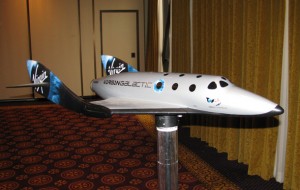On Monday, billionaire space advocate Richard Branson and New Mexico Governor Susana Martinez dedicated a new building devoted to commercial access to sub-orbital space: Spaceport America. This will be the new home of Virgin Galactic, Branson’s company that will take people into space.
Technically, this was simply a press event. There were no launches, and there’s nothing really new here. However, I do think this was important. Virgin Galactic is using vehicles built by Scaled Composites, the company that built SpaceShip One, the first private rocket that took a human into space (in 2004). Shortly thereafter they won the Ansari $10 million prize by being the first privately built rocket to get back into space after a 14 day turnaround. Tickets for SpaceShip Two are for sale at a mere $200,000 a piece.
 I know. The thing is, a lot of folks have bought those tickets, and this is for real. Two of my friends, Dan Durda and Alan Stern, astronomers with very serious resumes, are holding tickets. They know that a lot of science can be done even on a short suborbital flight, and they’re hoping to be among the first scientists to take that ride. You can read all about that in two articles I wrote last year: Part 1 and Part 2. I’ll note NASA has contracted for research flights on SS2 as well.
I know. The thing is, a lot of folks have bought those tickets, and this is for real. Two of my friends, Dan Durda and Alan Stern, astronomers with very serious resumes, are holding tickets. They know that a lot of science can be done even on a short suborbital flight, and they’re hoping to be among the first scientists to take that ride. You can read all about that in two articles I wrote last year: Part 1 and Part 2. I’ll note NASA has contracted for research flights on SS2 as well.
While this rocket doesn’t go into orbit – you get a journey 100+ km (60 miles) essentially straight up, to what’s called the Kármán line, the official point where you’re in space – it’s still a big ride, and you’re weightless for several minutes. And who knows? If this business takes off (har har) then there will be more money available to improve on it. And it means there will be more interest in space in general, I think, and that’s good for everyone. How long will it be before private companies like SpaceX sell tickets on their orbital vehicles? They’re already prepping to take crew and supplies up to the Space Station (in fact, Alan Stern created a Facebook page about getting commercial access to the ISS).
NASA’s future is anyone’s guess right now, as I’ve pointed out before. But I’ve also tried to hammer home the idea that NASA is not and should not be the only American-built way of getting to space. I think that private companies will fill a niche in space travel, and the next few years may see far cheaper and more reliable access to space.
Related posts:
- Researching at the edge of space
- Barnstorming the final frontier
- U.S. Air Force is opening up rocket contracts for competition
- SpaceX reveals plans for heavy lift rocket